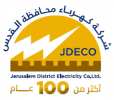Trainers: Agricultural and Irrigation
الوصف الوظيفي
لقد انتهت صلاحية هذه الوظيفة في 2024-10-20
تصفح أحدث الوظائف
عند التقدم لاية وظيفة عن طريق الانترنت، لا تقم بإعطاء معلومات بطاقة الأعتماد او أية معلومات بنكية / مالية لصاحب عمل. نصيحة من جوبس لحمايتك :
آخر الوظائف المعلنة بواسطة
CNFA
المسمى الوظيفي
تاريخ النشر
Procurement Officer
رام الله والبيرة
11, Jan
Capacity - Building Officer
قطاع غزة
8, Jan
Capacity Building and Agronomist Coordinator
رام الله والبيرة
29, Dec, 2024
Driver – Jerusalem ID
رام الله والبيرة
3, Dec, 2024
Finance Manager
رام الله والبيرة
28, Nov, 2024
Grants Agri Officer- Tulkarem & Tubas
طولكرم, طوباس
21, Nov, 2024
Procurement Officer-Gaza
قطاع غزة
14, Nov, 2024
Climate Smart Agriculture Officer
قطاع غزة
7, Nov, 2024








